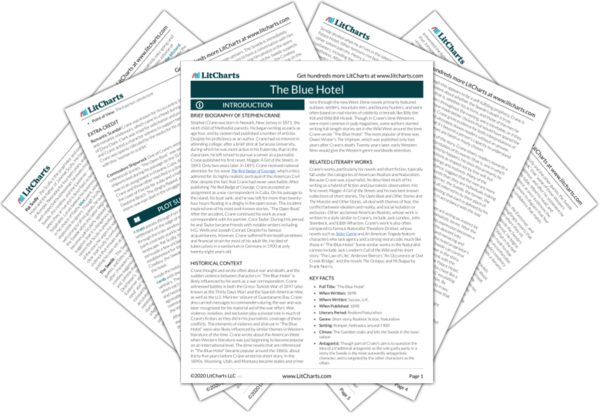Cards signify both deception and fate in “The Blue Hotel.” Cards first appear in the story when the Swede, the Cowboy, and the Easterner arrive at the Palace Hotel and see Johnnie and the farmer bickering over a game. Soon after, the guests themselves join in a game, during which the men all seem to be sizing each other up; in this way, the card game becomes a symbol of the elaborate deception that each man is trying to pass over on the others—the Easterner's attempt to feign innocent ignorance, Johnnie's false honesty, and the Swede's boasts at invulnerability are all deceptions that are built, and later crumble, during a game of cards.
Of course, a card game itself consists of both strategy and chance—in theory, all those who play are on equal footing, and a man's fate is partly luck and partly in his own hands. By playing cards, the men are effectively playing with fate. When the Swede, who is convinced that it is his fate to die in the blue hotel, accuses Johnnie of cheating at cards, he is not only accusing Johnnie of deceiving the other guests but also of manipulating fate to give himself the upper hand. The Swede’s actions here notably lead to a violent brawl, implicitly beginning to fulfill the prophecy he believes about himself.
Whether this prophecy fulfillment is ultimately of his own doing or out of his hands is left ambiguous by the story, and is probably, like a game of cards, a combination of both fate and agency. Though in some ways the men have a say in the course of events, when blizzard winds blow in through the window and scatter the cards from the table, Crane is making a clear point that despite their best attempts, the men cannot control fate. Crane ultimately uses the cards as a metaphor for his idea that fate is both random and the result of actions and behaviors, and this contributes to his philosophy on the guilt he believes each character should carry over the death of the Swede.
Cards Quotes in The Blue Hotel
The Swede backed rapidly toward a corner of the room. His hands
were out protectingly in front of his chest, but he was making an obvious struggle to control his fright. “Gentlemen,” he quavered, “I suppose I am going to be killed before I can leave this house. I suppose I am going to be killed before I can leave this house!” In his eyes was the dying-swan look. Through the windows could be seen the snow turning blue in the shadow of dusk. The wind tore at the house, and some loose thing beat regularly against the clapboards like a spirit tapping.
Of course the board had been overturned, and now the whole company of cards was scattered over the floor, where the boot of the men trampled the fat and painted kings and queens as they gazed with their silly eyes at the war that was waging above them.












